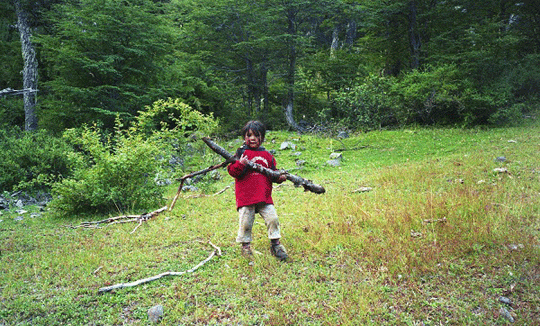



By Roger Rennan Fu
Published On: Sun, Oct 20th, 2013
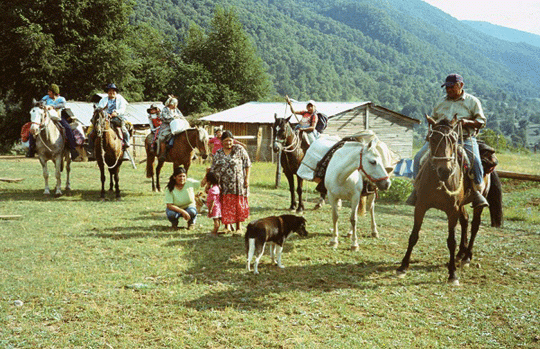
Special report: researcher Roger Rennan Fu follows a Pehuenche family struggling to comprehend a law suit that would strip it of its homes and livelihood.
Roger Rennan Fu is a PhD student in the planetary sciences at MIT. He lived for 18 months in Mapuche communities to document their traditional astronomical beliefs.
After a decade of relative calm, a group of indigenous Pehuenche from Southern Chile are facing the prospect of expulsion from their ancestral lands.
The corporation Inversiones TAMA Ltda. petitioned the Santa Barbara Civil Court on June 8 demanding the removal within 60 days of a group of 35 Pehuenche from lands in the Trapa Trapa community. The court has not ordered the forced expulsion due to persistent uncertainty about the legal ownership of the land. However, the petition will be carried out if the Pehuenche villagers cannot formally demonstrate the legitimacy of their claim.
The contested territory consists of 12,355 acres located 8.5 miles from the Argentine border. At its core is a grassy, V-shaped hillside that drops steeply into the Infernillo and Queuco rivers bounding it. Several natural terraces interrupt the otherwise treacherous slope. The houses of the eight Pehuenche families affected by the lawsuit sit on these terraces. The oldest of these dwellings were built with only a skillfully wielded axe, their roofs made of U-channeled logs alternately stacked upside down to divert the flow of rain. The newer houses, built after the opening of the road to the village, are topped with corrugated sheet metal. For the majority of the residents, these small houses and the animals that graze around them constitute the entirety of their possessions.
News about the petition caused panic among the villagers. In one case, Manuel Vivanco, who lives with his wife and two children, has begun to collect his family’s belongings. He has even disassembled portions of his house to anticipate a sudden arrival of Carabineros — Chile’s uniformed police — with orders to dislodge them. Manuel’s grandfather, the former chief or “lonko” of Trapa Trapa Atiltio Pereira, bemoaned that he did not sleep well for a week after he heard the news. Like his grandson, he was already imagining the worst.
“Every night I dreamed that I was walking aimlessly carrying my chair on my shoulder,” he said. “I didn’t know where to go.”
Even so, he added with a sense of humor, “at least I’ll have a place to sit if they kick me out.”
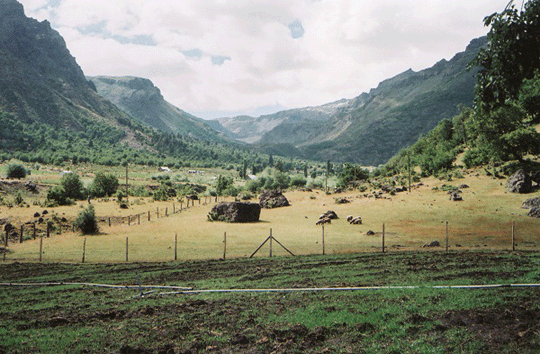
This was not the first time Atilio has lost sleep over the fate of the land he lives on. The June removal petition was the latest development of a lengthy legal battle that has seen Atilio and his half-brother José Mariluan pitted against the Serrani family, which owns several large estates (“fundos”) throughout the Bío Bío Region. The family has been represented by the corporation Inversiones TAMA Ltda since 2008.
The Serranis began legal proceedings against the Pehuenche brothers in 1997 when they first demanded the removal of the Pehuenche families from the disputed land. The lawsuit initially made little headway as the indigenous villagers held a Título de Merced — title deeds given to indigenous communities by the state following the military occupation of the Araucanía Region in the 19th century.
The tide turned, however, in 2007, when Atilio, who is illiterate and has a limited understanding of Spanish, signed a declaration that he and his brother are “usurpers” of the land on which they live. Atilio later attested that he signed the declaration without the presence of a translator and was not aware of the meaning of the word “usurper.” Although the legitimacy of this “confession” is highly questionable, the document holds legal weight and led to a conviction against the Pehuenche brothers in the Concepción Court of Appeals in 2008. Backed by this victory, Inversiones TAMA Ltda. is taking further measures to remove the Pehuenche villagers. The June petition is the latest, and strongest, of these actions.
Faced with the renewed threat to be expelled from their home, some of Atilio’s family members expressed their discontent at Atilio for letting his guard down when he signed the 2007 document. While sitting around the kitchen stove, Atilio’s daughter Amalia spoke up, “How could you sign something you didn’t know what it was saying? You’re not as sharp as you were in the old days!”
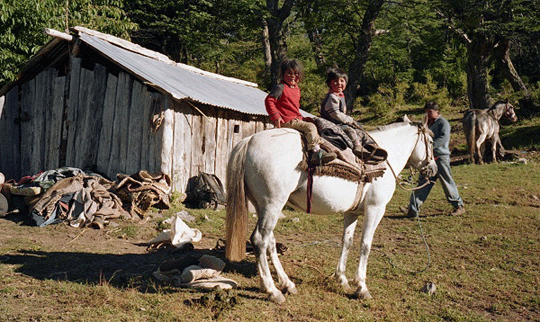
Amalia was referring to Atilio’s historic achievements during his 29 years as the village lonko. As one of Trapa Trapa’s first residents with a passable command of Spanish, Atilio represented the village in a number of lawsuits in the 1990s, culminating in the legal recognition for village ownership of several traditional pastures totaling more than 24,710 acres. He is no stranger to the methods of deception employed against the illiterate indigenous. Atilio once prided himself on his cautiousness.
“I never signed things unless someone I knew read it to me,” Atilio said. “Years ago some strangers from the city told me to sign a paper. They said it would bring a medical outpost to the village. They insisted, but I didn’t sign it. The lonkos from the other villages did. We later found out that it was a paper supporting the Ralco project.”
The Ralco Dam controversy, which began in 1997, saw Pehuenches from the nearby communities of Ralco-Lepoy and Avellano facing off with the energy giant Endesa over the building of a pair of hydroelectric dams, whose reservoirs would flood a portion of the villages — including a cemetery, a site highly sacred to the Pehuenche. The villagers eventually lost the court battle and the hydroelectric dams were completed in 2004.
Lands in Trapa Trapa were not directly affected by the events in Ralco. Even so, the expulsion of the villagers in Ralco-Lepoy and Avellano fuels fears of the things to come if Inversiones TAMA Ltd. proves successful in its petition. If the villagers are expelled, the long establishment of family plots and increasing scarcity of land in Trapa Trapa means that most will likely have to carve out new lives elsewhere. They will leave behind land that they have occupied since the late 19th-century, when a group of Pehuenches were driven to the valley of Trapa Trapa by the Conquista de Desierto campaign of the Argentine government, widely considered an act of genocide by modern historians.
Some locals, including the lonko of the neighboring Buta Lelbun community, Elias Pereira, have pledged support in their fight against Inversiones TAMA Ltda. Personal friendships and loyalties run deep in the small communities of approximately 200 households, where nearly every family can trace some kinship to every other.
Yet beyond moral solidarity, practical welfare is at stake for the community at large. The plot of land under contention sits at the narrow mouth of an expansive valley, and several dozen Pehuenche families from Trapa Trapa and nearby communities drive their animals through the territory. Restricted access along this thoroughfare would require the relocation of their cattle herds to more heavily grazed pastures, thereby further taxing the village’s scarce resources.
Cattle herding has traditionally been the Pehuenches’ primary source of income. The Pehuenches, or people of the Araucaria tree, are a sub-group of the greater Mapuche culture. Compared to their much more populous cousins in the Araucanía Region, the Pehuenches have led a relatively isolated and peaceful existence. This isolation has led to spectacular preservation of their aboriginal culture — Trapa Trapa and the neighboring community of Buta Lelbun are likely the last settlements in the world where 100 percent of the population is fluent in Mapudungun. Overhearing the chatter among children in the village schools, one quickly notes that the youngest students speak hardly a word of Spanish. The older ones, having been through years of classes and taking a greater interest in movies and music from the outside world, speak a mixture of the two languages.
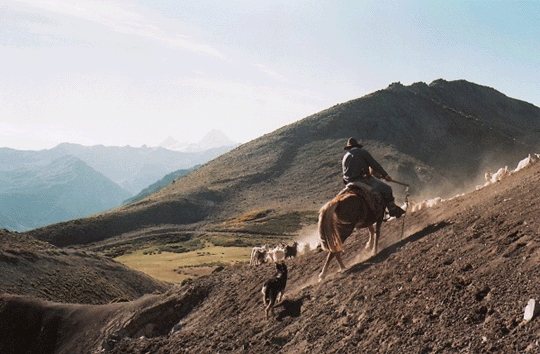
The isolation of Trapa Trapa and its neighboring communities also means that they have experienced fewer land-rights struggles that plague the Mapuche communities further to the south. Buta Lelbun, in particular, has been so far removed from the Chilean population at large that no non-indigenous party has ever made claim to the land. However, it is the only community to count on this good fortune. In the case of Trapa Trapa, the Chilean government has promised to purchase the majority of its ancestral territories on behalf of the indigenous community, although the 12,355 acres plot contested by the Pereira brothers and Inversiones TAMA Ltda. is not part of this planned purchase.

Atilio and his family have also generally lacked effective legal aid from the government. Given the Pehuenche villagers’ lack of education — only the two youngest family members who are in their early 20s have completed high school — they have consistently been unable to grasp the intricacies of the current court case. Only after the arrival of the court petition in June did the residents come to realize that the decline in their fortunes came at a stroke of a misguided pen in 2007.
In response to this realization, the families have, for the first time, determined to pool their resources and seek professional aid to continue the legal battle. Marlene Matte, a lawyer based in nearby Los Ángeles, has agreed to represent the Pehuenche brothers pro bono, providing aid to the National Indigenous Development Council (CONADI) appointed lawyer Carolina Mora. Ongoing efforts to overturn the 2007 conviction center around proving that the signing of the 2007 “usurper” declaration was invalid. Chilean law requires that courts provide translators for parties that do not have an adequate understanding of Spanish. Matte and her colleagues will attempt to prove that this condition was not met. A court decision whether to uphold the 2007 conviction will likely come in early 2014.
In the mean time, the Pehuenche families, with Marlene’s aid, have attempted to bring public attention to the case. A group of 30 villagers, most of whom live on the disputed land, staged a march on the municipal building in Los Ángeles on July 13. The participants held banners that read “Libertad al Pueblo Pehuenche (Freedom to the Pehuenche People)” and “Fuera TAMA (Get out TAMA).” A handful of bystanders supported the Pehuenche with cries of “Fuerza a los Mapuches!”
Even so, the outcome of the court case remains in doubt, and a sense of fearful uncertainty still pervades the affected Pehuenches. For more than a decade, the Pehuenche have watched the ongoing land rights struggle in the Temuco area from a distance, and even the bitter memories of the Ralco Dam have been slowly fading. The abrupt revival of Inversiones TAMA Ltda.’s efforts for their expulsion jolted the villagers to the realization that their centuries-long fight for ancestral lands still continues. In this struggle, they risk losing not only their livelihood and way of life.
“The saddest thing about this conflict is the loss of innocence,” explained Pereira’s daughter María as she wiped away tears. “The children who grew up here after Ralco have lived in their own little world until now. Now they will see what the ‘winka [non-indigenous people]’ want to do to us. I do not want my children to hate anyone.”
